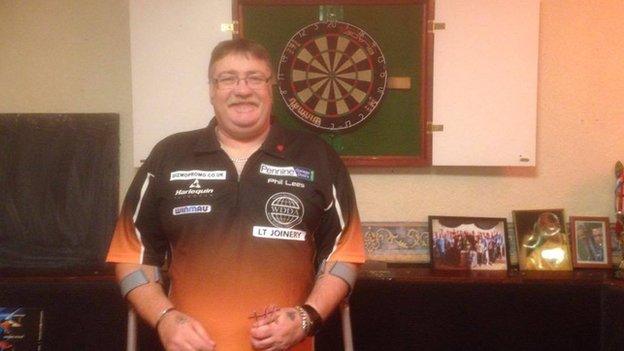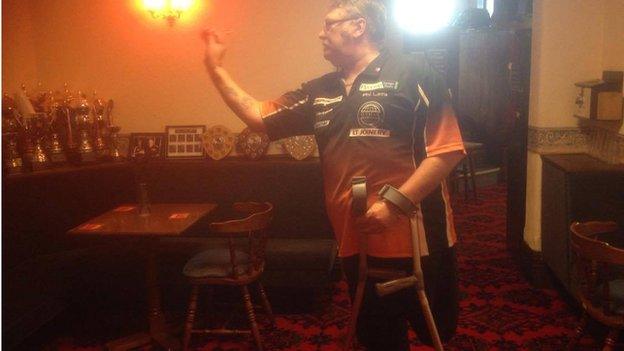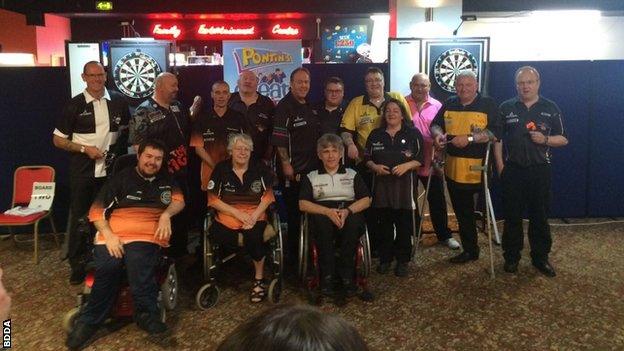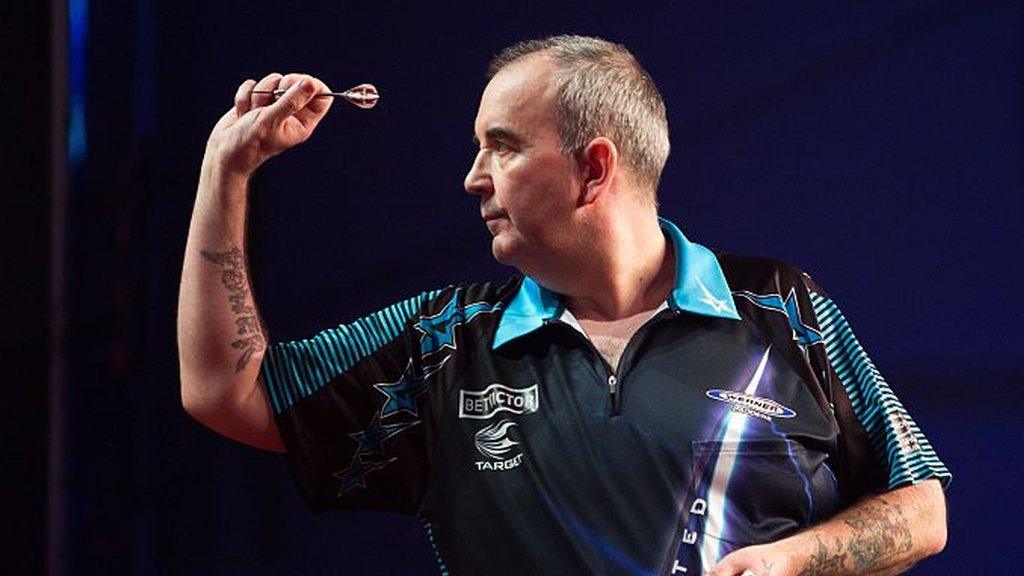Disabled darts: 'There are potential throwers everywhere,' says World Masters finalist
- Published

Phil Lees, 55, has been successful in the sport of disabled darts since losing his left leg to cancer
In recent years, the world of darts has been taken out of the pub and into the public limelight like never before.
Similarly, disability sports have used the platform of the London 2012 Paralympics to develop wider audiences and greater participation, a process that is still moving forward at pace.
So it only seems natural that eventually the two would cross paths.
In 2010, the first adapted dartboard to allow those with differing disabilities to compete fairly was designed and - according to the World Disabled Darts Association (WDDA), external - the World Darts Federation "extended a hand of friendship and support to those living with disability" on 8 October 2012.
Since then, the WDDA has established its flagship event alongside the British Darts Organisation's (BDO) World Masters at Lakeside, and players from across the world have been unearthed.
"We're just about scratching the surface at the minute, there are potential disabled darts throwers everywhere," says three-time disabled darts World Masters finalist Phil Lees.
"The way things have gathered momentum in the last two years, it can only go forward."
'I thought - that's it, I'm finished'

Phil remains the captain of the Denton Conservative Club darts team
Lees' love affair with darts started on a board in his friend's garage when he was 15, and it has taken him "everywhere, all round".
The Mancunian played at local and regional level, coming up against future top players like Stockport's Tony O'Shea, who competes in the BDO. Lees "did all right" by his own admission, but he "never really made it".
However, darts was set to one side in 2005, when the sudden onset of hip cancer necessitated the amputation of his left leg.
"At that point I thought 'that's it, that's my darts finished'," Lees, now 55, told BBC Get Inspired.
And for a spell it was, until a chance encounter in a pub in his hometown Denton, in south-east Manchester.
"Some lads I knew in the pub asked if I could still throw," he remembered.
"I'd chucked a couple at home, but nothing competitive. They asked if I could play for them that night, so I did, and I won 2-0, hit a 112 finish and three tons.
"I've been playing every week since."
'The pinnacle of your darts career'
Businessman Russ Strobel founded the WDDA in Australia in 2009. It quickly became global, culminating in the disabled darts' World Masters, inaugurated in 2014.
Strobel also designed a bespoke dart frame for disabled players,, external which features a swivel-hinged back-to-back board, standard height on one side, lower on the other to allow matches between wheelchair users and those standing.
After contacting the WDDA in 2013, Lees was invited to play in the first World Masters - finishing second. Since then the sport has progressed rapidly.
The 'Road to Winmau' follows the BDO format of wildcards and qualifying points, with four national competitions in England, international competitions and a final played alongside the BDO's best at legendary venue Lakeside in Surrey.
"That first World Masters was the biggest thing I'd ever done darts-wise in my life, and I came runner-up," said Lees.
"Since then it's steamrollered and got bigger and bigger. This is the biggest World Masters for us so far.
"It's the pinnacle of your darts career. Win or lose, you're playing at Lakeside."
'I never thought this could happen'
As the game has grown, so has its reach.
Lees continues to play on both the Winmau tour - he will play at Lakeside from 1-4 December - as well as locally and regionally alongside able-bodied competitors.
However, he is now turning his hand to administration as well, becoming an integral member of the British Disabled Darts Association,, external which launched this year.
Future developments could lead to an international World Cup of Darts-style competition - although to represent his country, the father of five said that he will have to invest in a passport.
For now though, Lees is happy to reflect on the memories darts have given him, and how the sport has helped him move on positively from a traumatic event.
"It's even more important to me than I ever thought it could be," he said.
"When I was younger and playing in county matches, I never expected anything like this.
"All of a sudden, my leg happens, and I just get propelled forward. It's brilliant for me, I never could have thought it could happen."
'When the dart lands they're buzzing'
But not every disabled athlete who picks up a dart can compete at Lakeside. What does the sport offer the casual dart-thrower?
Strobel has said of darts that "of all sports, none holds greater potential to improve one's overall feeling of wellbeing long-term."
Lees is a committed ambassador for the sport, and regularly helps beginners getting involved in the sport. To what extent does he agree with Strobel's words?
"It's been amazing in the last few years," he said.
"You see the lads in wheelchairs, some of the lads that really, really struggle, but they still want to get involved.
"There is a large spectrum of disability from cerebral palsy to amputees. It's brilliant to be getting them involved.
"You see some when they're throwing and a dart lands and they're absolutely buzzing. I think anybody who is sat in a wheelchair thinking they'd like to have a go at darts should do it because it's brilliant."
'It's about getting involved and having an interest'

The British Disabled Darts Association was formed in 2016
With disabled sport commanding more attention across the board, what can the future hold for disabled darts?
Some believe the achievements of 16-time world champion Phil Taylor fail to stand up to those of other sports legends because of a perceived lack of athleticism in the sport.
So how can disabled darts stand up to scrutiny against the likes of British Paralympian Kadeena Cox, who won gold in both cycling and sprinting at the Rio Paralympics this year?
In many ways the question is redundant - the future of disability sport is ensuring everybody can find a sport for them, with elite athletes acting as inspiration for participation, not an intimidating barrier against it.
"If the Paralympics doesn't push people forward to doing something then nothing will," said Lees.
"And I know that darts is a long way from the 100m, but it doesn't matter. It's about doing something, getting involved and having an interest.
"I think if you can chuck darts out of a wheelchair or on one leg, then there's nothing to stop you from doing other stuff as well.
"People who play darts, it isn't just the darts, it's about getting competitive and caring about something. It's good for you."
- Published21 September 2018
